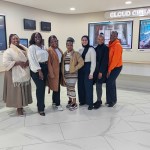In South Africa, glaring and persistent inequality threatens our very existence.
The recent July riots and looting are a taste of what might follow if we don’t address our problems with a sense of urgency. While the initial spark may have been politically instigated, the tinderbox of our unstable society was quick to catch alight.
We need leaders with the passion to address our considerable challenges and the ability to work collaboratively with others to effect change.
Courageous Leadership
In a world where uncertainty and change are the only constants, how can we be the leaders South Africa and the world needs?
Carrie Pratt, lead facilitator of the GIBS Nexus Leadership Programme, explained: “We need the courage to look clearly at the current reality, the creativity to imagine a different future and the urgency to implement change.”
Leaders must ask themselves, “What are the big, intractable problems that South Africa faces and what can we do, where we are, to address them?” This is not an issue of charity. It is fundamental to creating an environment in which people, the enterprises which serve them and the planet are all able to thrive.
The events of July came as something of a wake-up call, accompanied by a recognition of the need to accelerate the implementation of desperately needed reforms.
President of Business Unity South Africa, Bonang Mohale, recently told Business Day:
“If you think the rioting and looting we saw in July was traumatic, it is going to happen again unless you address the underlying, fundamental root causes: inequality, poverty, unemployment. Without the rapid implementation of structural reforms there won’t be enough investment or economic growth to prevent an even more calamitous explosion.”
In her October 2020 Harvard Business Review article How the Best Leaders Answer “What Are We Here for?” Professor of Practice at the University of Bath School of Management Margaret Heffernan said: “Leaders have to shift their goals from maintaining the status quo to constructing a newly imagined future.”
The role of a leader is increasingly becoming that of someone who is able to learn, unlearn and relearn. Someone who can engage with multiple perspectives to understand complexity and who can work with diverse stakeholders to imagine and to create a better future.
Heffernan continued: “Leaders are required to define the purpose behind and beyond their organisations. The leader-as-activist role will only become more critical. The nature of their jobs will differ, but their purpose will be the same: To outrun irrelevance by convening and listening to both central and marginal voices in the societies they serve, nurturing an ambition that far outstrips survival.”
Leadership capabilities
Who are the thinkers imagining this new future, and what does it look like?
Self-awareness, contextual awareness, and a learning mindset are all critical leadership competencies.
- Self-awareness
Resilience is an important skill for leaders in today’s constantly changing world. And while change is inevitable, we are better equipped to deal with change when we have the self-awareness to know how it affects us.
Authenticity, Pratt explained, is a combination of self-awareness and the courage to voice divergent views: Leaders know and are willing to say what they think, but also to accept the limits of their knowledge and to learn from the experience and wisdom of others.
“It starts with the self, then you are able to empower other people,” Mthokozisi Sithole, Creative Director at McCann 1886 and Nexus Leadership Programme participant said. “Leaders need to be authentic in all aspects of their lives. Activist leaders must make certain that their entire life aligns. It is about authenticity and consistency – be that person wherever you are.”
Mikara Naidoo, Service Designer and Architect at Freethinking Consultants and Nexus Leadership Programme participant said: “Defining your role as a leader requires introspection about how you engage with the world externally. While you can be strong in your convictions, you have to also be accepting of other people and have the utmost respect for them. Leaders need people who don’t necessarily agree with them to respect them.”
- Contextual awareness
Contextual or social awareness is an understanding of the bigger picture in a rapidly changing world.
Leaders cultivate a deep understanding of the social, economic and political landscape in which they operate and are able to engage with multiple perspectives in ways that engender trust, broaden horizons, and yield innovation.
Developing contextual awareness includes looking clearly at the past and present of our country: “Our history lives with us. It is present in the traumas we carry and in the ways we relate to one another. South Africans often want to look away from this, but our history comes to work with people every day. It shows up in the relationships between people on teams and within organisations,” Pratt said. “Because of our history, we often live and socialise with people who look and think largely the same way we do but we cannot lead effectively until we break out of those bubbles and gain a more nuanced and complex understanding of the past and the ways it inhabits the present.”
Having contextual awareness means we can no longer operate in silos – it is having the courage to not look away from our circumstances, surroundings and the abject poverty that many live in. It is an awareness of the fact that the way in which we are living is simply not sustainable, and that the consequences of ignoring our circumstances could be dire.
- A learning mindset
A rapidly changing world requires leaders with the capacity to unlearn and relearn as a means to deal with complexity, bringing new perspectives to old challenges. A learning mindset supports leaders to become more adaptive, collaborative and skilful at engaging with complexity. It enables them to engage meaningfully with people and places they may not usually encounter and allows them to see potential in people and situations which they might otherwise overlook.
The future is at stake. Today’s leaders have no choice but to be brave enough to initiate significant conversations – and to work – with others who may hold diverse perspectives but who all desire a future in which everyone, and the planet, can thrive equally. DM
About the Nexus Leadership Programme
This transformative leadership programme is designed to equip leaders in business, civil society and government with both the self- and the social-awareness to lead effectively in this complex and rapidly changing world. Nexus aims to transform the ways leaders make-meaning of the world around them, enabling them to be more adaptable, more collaborative, and more skilful in engaging with complexity in their personal and professional lives. In the process, leaders’ perspectives broaden from more individual concerns to a focus on the needs and concerns of society as a whole. For more information please click here


















Comments - Please login in order to comment.